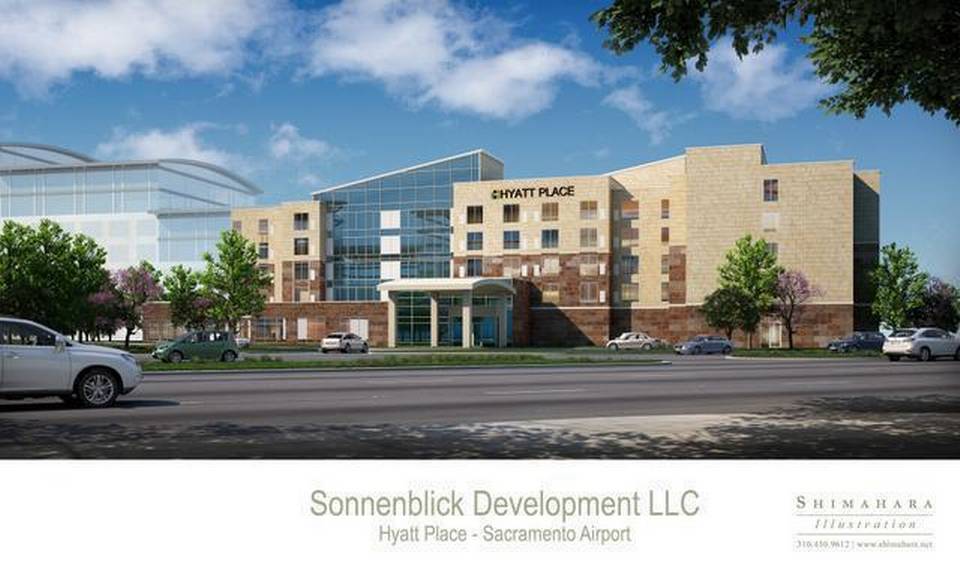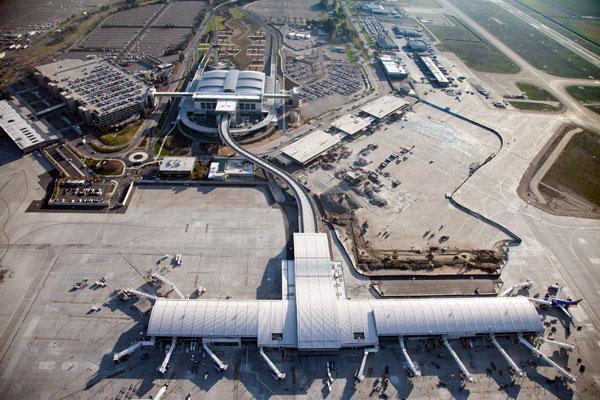
By Tony Bizjak tbizjak@sacbee.com
01/23/2015 9:31 PM
Seven years after tearing down the old airport hotel, Sacramento International Airport has reached a deal with a private developer to build a new facility on site – a five-story hotel that will sit within short walking distance of both passenger terminals.
The deal, years in the making, will provide airport customers with a privately built 135-room Hyatt Place. The hotel will include an indoor pool and spa, fitness room, dining area and 3,500 square feet of meeting space.
Airport director John Wheat called the hotel deal a double bonus, returning a major passenger amenity to airport grounds and providing a needed income boost. Airport officials have sought ways to boost revenue to pay down a $1 billion debt load from the recent construction of a new terminal and passenger concourse building.
“It is definitely a nice convenience to our passengers,” Wheat said. “We look at it as a customer service. And, secondly, it generates additional revenue to the airport system.”
The developer, Sonnenblick Industries LLC of Southern California, has been negotiating for two years with the county on the deal. Sonnenblick , the sole company to respond to the airport’s request for proposals, specializes in government buildings but has built a number of hotels and increased its hotel development in recent years.
The airport tore down the previous on-site hotel in 2008 to make room for Terminal B. Officials had originally planned to build a new hotel several years ago as part of the Terminal B expansion project, but were forced to eliminate it as a cost-saving move during the recession.
Until recently, the airport and other Natomas-area landowners have been unable to build new structures because of a de facto building moratorium until flood improvement funding was authorized. That moratorium appears ready to be lifted this spring or summer.
Airport officials will present the deal to the county Board of Supervisors on Tuesday for approval.
According to a staff report for that meeting, Sonnenblick will build the hotel on a 1.4-acre site it will lease from the airport next to the parking garage. The developer will pay the airport a one-time fee of $2.46 million to use 164 ground-floor spaces in the garage for guest parking.
The company also will pay the airport an annual $900,000 in rent for the first four years. In year five and beyond, the rent will be set at a percentage of hotel gross revenue, estimated to be about $475,000 in year five.
The hotel construction cost, to be borne by Sonnenblick, is expected to be about $24 million. Construction is expected to take two to three years.
The hotel site will be on a triangular grassy area, currently unused, at the north end of the parking garage.

Jan 23, 2015, 7:25am PST
Mark Anderson Staff Writer- Sacramento Business Journal

Todd Quam | Digital Sky Aerial Imaging
In a major step forward for Sacramento International Airport, county supervisors on Tuesday will consider a development agreement for a 135-room Hyatt Place hotel to be built between the two passenger terminals.
In a major step forward for Sacramento International Airport, county supervisors on Tuesday will consider a development agreement for a 135-room Hyatt Place hotel to be built between the two passenger terminals.
Sacramento County, which operates the airport, has been seeking a hotel for more than a decade. The previous hotel at the airport, the Host Airport Hotel, was successful, but the small hotel was demolished for the expansion of the airport’s new terminal and parking garage.
The five-story hotel would be just north of new parking structure at the airport, between the two commercial airline terminals.
Hospitality company Sonnenblick-SMF LLC would develop and operate the hotel, paying the county a fixed fee of $900,000 though the first four years of operations, and then a scale of percentage of gross revenue. That scale would be 5 percent from years five through 19, 6 percent in years 20 through 39 and then 7 percent of gross in years 40 through 50.
Hyatt Place is a limited-service property. Locally, there are Hyatt Place properties in Davis, Rancho Cordova and Roseville.
Sonnenblick-SMF LLC would negotiate a contract with the UNITE-HERE Local 49, the local hotel and restaurant employees union. The previous hotel had been a union shop.

Bob Sonnenblick speaks at the Caribbean Hotel Investment Conference
November 21 2014 Speakers at the Caribbean Hotel Investment Conference & Operations Summit lament a lack of financing that has created a dearth of deals, but they don’t expect it to last forever.
By Jeff Higley
Editorial Director
jeff@hotelnewsnow.com
PUNTA CANA, Dominican Republic—Buyers are laboriously prudent when it comes to hotel assets in the Caribbean, and speakers at last week’s Caribbean Hotel Investment Conference & Operations Summit agreed the process isn’t going to be any more fluid in the foreseeable future.
The biggest issue is easy to spot, panelists said. Despite strong performance fundamentals for the region’s hotel industry, lenders are reluctant—and in a number of cases unable—to throw their hats in the ring when it comes to deals.
“The performance numbers aren’t translating into the availability of capital,” said Gary Brough, managing director of KPMG, during the “Capital and the new normal” general session.
“Right now there is a ton of money going into the hotel business in the (U.S),” said Bob Sonnenblick, principal of Sonnenblick Development. “It’s going to take time to trickle down here.”

Adam Rosenberg (right) of Fortress Investment Group and Gary Brough (center) of KPMG react to a comment from Bob Sonnenblick of Sonnenblick Development during the -Capital and the New Normal- session at last week’s Caribbean Hotel Investment Conference – Operations Summit. (Photo: Jeff Higley) –
“The good and the bad of the region is oftentimes the absence of senior debt, or if there is senior debt you’re talking about 50% equity,” added Nick Hecker, senior principal at Och-Ziff Real Estate.
Bill Sipple, executive managing director of HVS Capital Corporation, said it’s difficult to source capital for the Caribbean, but cracks in the armor are starting to appear. He said one bright spot is U.S. commercial mortgage-backed securities lenders, which are starting to show an interest in the region.
“They’re seeking ways of finding new avenues that are less competitive and where they can get higher yields,” Sipple said.
Lorne Bassel, president and CEO of Crave Real Estate, said during the “Investor/capital provider outlook” general session that investors who have a clear intent to stay in the deal for the long run are more apt to obtain financing.
“(Lenders) want to see a compelling vision in the plan that makes your project different,” Bassel said. “Marina, golf and beach just isn’t enough. They want to see you bought in financially for the next 10 years.”
But Ali Elam, managing director of Fortress Investment Group, said there’s a simple reason large banks aren’t lending into the Caribbean: “They simply do not have the facility to make loans in the Caribbean. It’s not something they invested in infrastructure for.”
Another issue is rating agencies don’t have coverage in all 32 countries in the Caribbean, Elam said.
The obvious lack of capital creates a shallow deal environment in the region.
George Spence, principal of Leading Property Group, said while some deals have been completed during the past 18 months, it’s going to take at least that long for the flow to increase.
“The Caribbean is 18 to 24 months behind the U.S. in terms of capital and new deals going on,” he said.
Spence noted several key transactions in the Caribbean during 2013 and 2014, including the former Ritz-Carlton Rose Hall in Jamaica that sold to Playa Hotels & Resorts for $70 million and rebranded as the Hyatt Zilara Beach, and the 105-room One & Only Ocean Club in the Bahamas that was sold to Access Industries for a reported $1 million per room.
Interest is building
There is growing interest in acquiring hotels in the region from players such as Fortress Investment, according to managing director Adam Rosenberg. But a deal would have to meet certain criteria for the company to make an acquisition.
“There’s a paradox,” Rosenberg said. “The world seems awash in capital … yet it’s very hard to find a deal from a return perspective. It’s hard to find things that are the right fit. (The Caribbean is) off the radar for a lot of capital providers.”
Sipple said the appetite for projects in the Caribbean tend to be in the $30-million to $100-million range.
“It doesn’t have to be a mega deal to get interest,” Sipple said. “There’s a lot of non-resort type of properties that can be built here. There’s a need for them.”
“If you’re going to spend the time to put capital out, you might as well do a large project,” Sonnenblick said, acknowledging that select- and limited-service properties have a place at airports in the region.
Elam said Fortress’ acquisition of the debt on the Westin Grand Cayman Seven Mile Beach Resort and its refinancing of the Aruba Marriott Resort is proof the company thinks the recovery in the Caribbean will continue. The two deals combined equated to a $470-million investment he said.
“Investment in the Caribbean will always be a deep pocketed investment game, knowing that eventually you’ll have an investment that’s unique,” Elam said.
Help from governments go a long way
Panelists agreed that some of that investment should be offset by governments that want to attract development and capital infusion into their countries.
A prime example of that is the Dorado Beach, A Ritz-Carlton Reserve, in Puerto Rico, according to Kenny Blatt, principal and COO for CPG Real Estate, which owns the property.
“Government participation allowed us to slog through three or four tough years,” Blatt said during the “Hospitality Leaders Outlook” panel.
The $1,200 to $1,300 average daily rate for the property has given CPG reason to develop the other 1,400 acres of land around the project, according to Blatt. The company refinanced Dorado Beach on Wednesday with Och-Ziff providing the financing.
“It gives us liquidity to build real estate, including hopefully building a second hotel site,” Blatt said.
The effects an active government can have on resort development and transactions aren’t always visible, speakers said.
“When people talk about cash flows and returns on a project, the first question I have is always, ‘What is the tax impact?’” Hecker said.
There’s also a difference between strategic investment and economic investment in the Caribbean, panelists said.
“The most strategic investor is generally the government,” Sonnenblick said. “I’m surprised there isn’t more going on in the Caribbean where the government is doing more.”
John Keith, managing director for Caribe Hospitality, said policies of some of the Caribbean governments, especially the foreign exchange rates, make it difficult for the hotel industry to be successful.
“I would challenge the governments to review their policy,” he said, adding they must understand they are competing in a world full of alternatives.

Sonnenblick Development principal Bob Sonnenblick
November 14, 2014

Bob Sonnenblick panelist at Hotel Summit on November 11th, 2014 in Los Angeles
Hotel Summit on Tuesday November 11th 2014
Sonnenblick Development principal Bob Sonnenblick, a panelist, says LA just finished its best 12 months ever in total volume of hotel bookings and tourism, and supply is under control. In general, the coasts are very strong but the middle of the country is still fairly flat. He’s 100% concentrated on new development, but his biggest problem is that there is no land left in LA. (It’s why Katy Perry is always Walkin’ on Air.)
Our moderator, Arent Fox’s Rich Brand, asked panelists about hotel chains launching new brands and categories. Brian says the demographic he’s pursuing doesn’t value a big flag, and he notes independent hotels weathered the downturn along with their bigger cousins. Maki says loyalty points matter to Baby Boomers and Gen X, but a large portion of Millennials are brand-agnostic.
Bob says there are certain locations where you might be better off without a big brand if there’s an external room generator you can use instead (think beaches or convention centers). In addition, construction lenders now are more open to projects without a brand.
Rich says he’s seeing a lot of deals for limited and select-service hotels, and fewer full-service ones being built. Bob says the former have a higher profit margin because you don’t have a big spa, room service or gobs of meeting space. “It’s a rooms-only box.” Brian says the debt and equity markets love limited service because they view it as less risky. For his San Francisco project, he cobbled together EB-5 financing, historic and New Market tax credits, and a low-leverage senior construction loan.

Read full article at Bisnow









